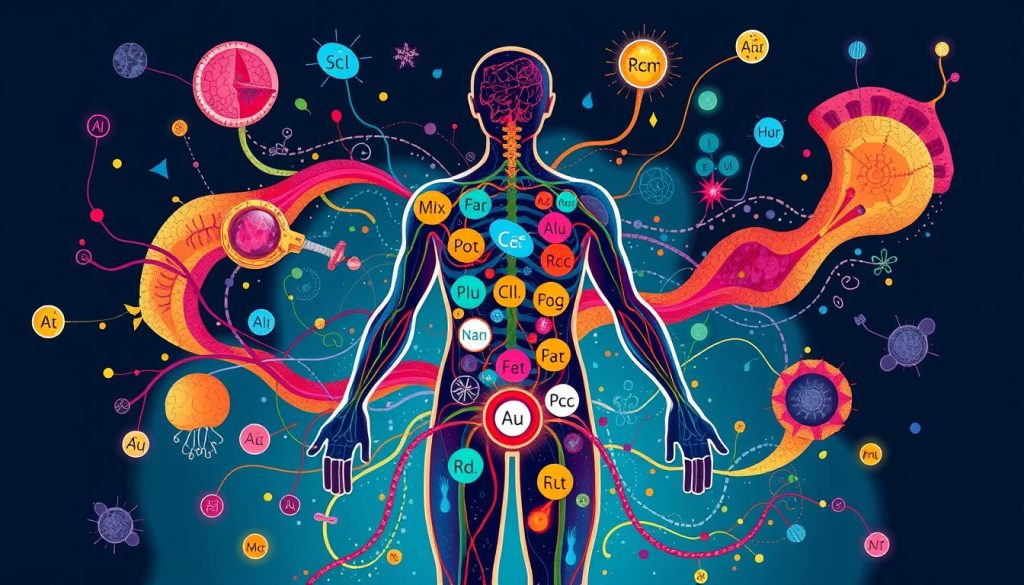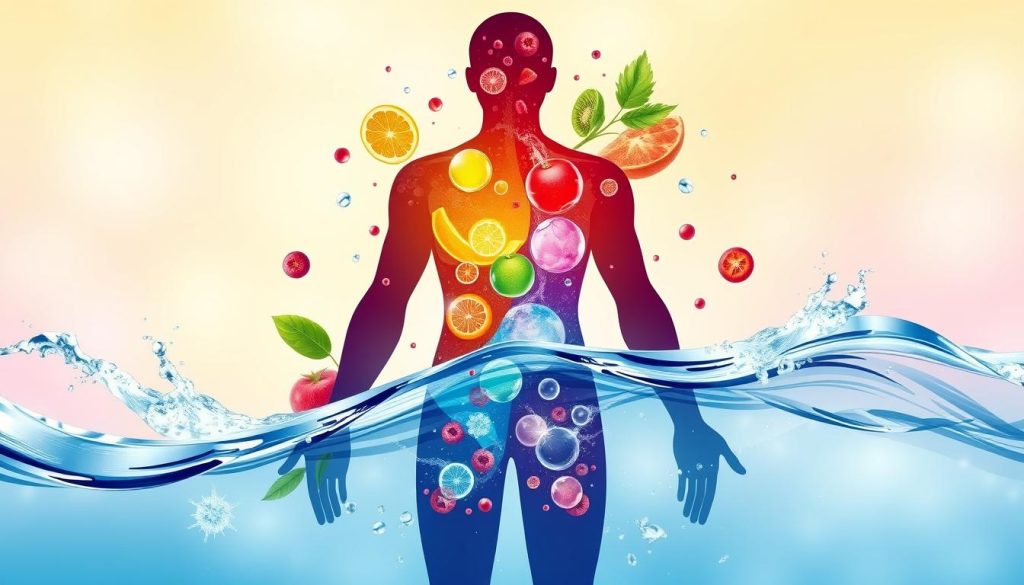Electrolytes are key for health, not just for athletes. They are minerals that carry an electrical charge. They help our bodies function every day.
They keep our fluids balanced, support nerves, and keep our body’s pH stable. These minerals work hard to make sure our bodies work right.
Electrolytes are important for staying active. They help us perform better and recover faster. Keeping a healthy balance of electrolytes is key for athletes and active people.
We’ll explore how electrolytes improve exercise and recovery. Knowing how to use them can change your health and hydration game. Let’s dive into the world of electrolytes and their benefits for your body.
An Overview of Electrolytes and Their Significance
Electrolytes are minerals in your body with an electric charge. They are key for many bodily functions and keep you healthy. Knowing why are electrolytes important and how electrolytes function in the body shows their value in staying well.
Important electrolytes are sodium, potassium, chloride, calcium, and magnesium. Each one does a specific job. They help with muscle function, nerve signals, and keeping you hydrated. Let’s dive into each one:
- Sodium: Controls fluids in the body, affecting blood pressure and cell function.
- Potassium: Important for heart and muscle health, also helps with nerve signals and fluid balance.
- Chloride: Keeps body fluids balanced and is key in digestive stomach acids.
- Calcium: Essential for strong bones and teeth, muscle contractions, and nerve signals.
- Magnesium: Supports many body functions, including energy and protein creation.
The importance of electrolytes is clear when you see how they affect our bodies. They are vital for life-sustaining functions. Each electrolyte plays a role in keeping our bodies working well and healthy.
It’s important to keep electrolyte levels balanced. Too much or too little can cause problems with energy, muscle strength, and health. Eating foods rich in electrolytes helps keep our body systems working right.
Decoding Electrolytes Function in Maintaining Health
Understanding electrolytes is key to good health. Electrolytes are minerals that carry an electric charge. They help balance fluids, transmit nerve signals, and support muscle function. This makes them vital for health and preventing imbalances that can cause problems.
The Science Behind Electrolyte Balance
Keeping electrolytes in balance is essential for health. It means having the right amounts of ions like sodium, potassium, and chloride. If these levels get out of balance, it can lead to dehydration, heart rhythm problems, and even neurological issues. It’s important to keep electrolytes balanced to help the body work right.
Electrolytes and Their Impact on Bodily Systems
Electrolytes affect many parts of the body. Here’s how they help in three important areas:
- Nervous System: Electrolytes like sodium and potassium are key for nerve function and sending signals.
- Cardiovascular System: Potassium, magnesium, and calcium help keep the heart beating right and blood pressure steady.
- Renal System: Electrolytes help control fluid levels and acid-base balance, which are key for the kidneys.
The balance between these minerals is critical. Eating the right foods and sometimes taking supplements can help keep this balance.
| Electrolyte | Function | Significance |
|---|---|---|
| Potassium | Regulates nerve signals and muscle contractions | Essential for heart and muscular function |
| Sodium | Maintains fluid balance, aids nerve transmission | Vital for blood pressure regulation, |
| Calcium | Key in blood clotting and muscle movement | Crucial for maintaining strong bones and teeth |
| Magnesium | Supports over 300 enzyme reactions | Important for metabolic function and DNA synthesis |

Electrolytes and Hydration: A Crucial Connection
Understanding the benefits of electrolytes is key to staying healthy. Electrolytes are vital for good hydration. They help keep our cells working right.
Electrolytes and hydration are closely tied. Without enough electrolytes, even drinking lots of water can’t prevent dehydration. Electrolytes keep our cells full of water and help our muscles and nerves work well.
For more on how nutrients affect us, like hair loss, check out this article on essential vitamin deficiencies.
Good hydration is more than just drinking water. It’s about getting the right mix of electrolytes like sodium, potassium, and magnesium. This mix is important for our physical, mental, and emotional health.
- Sodium helps control water levels in our body and supports muscle and nerve function.
- Potassium is key for nerve signals and muscle movement.
- Magnesium is vital for making energy and processing nutrients.
The benefits of electrolytes include avoiding dehydration’s bad effects like tiredness, muscle cramps, and feeling dizzy. Keeping electrolyte levels balanced can prevent these issues. Drinking electrolyte-rich fluids or taking supplements regularly is important for staying healthy.
In summary, knowing how electrolytes and hydration work in our bodies is important. It shows why we need a balanced diet and to drink water wisely. This partnership is key to staying healthy and avoiding dehydration and electrolyte problems.
What do Electrolytes Do for Your Body
Electrolytes are key to a healthy body. They help with muscle contractions and keep our cells hydrated. Knowing how they work can help us stay healthy and boost our physical abilities.
Optimizing Physical Performance
Electrolytes are vital for top physical performance. They help our muscles work right by sending signals for contractions. This is important for athletes and anyone who’s active.
Having the right amount of electrolytes means muscles don’t get tired easily. It also lowers the chance of getting cramps. This keeps us performing at our best.
Enhancing Nutrient Absorption
Electrolytes also help our body absorb nutrients better. They carry vitamins and minerals to where they’re needed. This is key for energy and staying healthy.
With enough electrolytes, our body uses nutrients well. This supports our brain, bones, and more. It’s all about staying well and strong.
- Maintain fluid balance within the cells
- Support nerve function and muscle contractions
- Help in the effective transportation of nutrients to various parts of the body
By keeping an eye on our electrolyte levels, we can do better in sports and absorb nutrients better. This shows how important electrolytes are for our health every day.
Boosting Exercise Performance Through Electrolytes
Knowing how electrolytes boost exercise performance is key for athletes and fitness fans. Electrolytes help with energy, muscle function, and workout success. It’s more than just staying hydrated.
Electrolytes like sodium, potassium, and magnesium are vital. They help with nerve signals, muscle contractions, and keeping fluids balanced. Without enough, you might feel tired, get cramps, or take longer to recover.
- Sodium keeps fluids balanced and supports nerve and muscle function.
- Potassium helps control heartbeat and muscle function, key during long workouts.
- Magnesium is important for energy and helps muscles relax, preventing cramps.
Using a good electrolyte plan before, during, and after hard workouts can really help. Drinking electrolyte-rich drinks and taking supplements when needed keeps levels right. This way, you can do better and recover faster.
Electrolytes and Muscle Function: An Essential Relationship
Learning about electrolytes and muscle function shows how important electrolytes are for our health and sports performance. These minerals, like sodium, potassium, calcium, and magnesium, help with nerve signals and muscle contractions. They are key for muscles to work well.
Electrolytes help send signals in nerve and muscle cells, which is important for muscle movements. Without enough, muscles can get weak or too tight, causing cramps and spasms. So, keeping the right balance of electrolytes is vital for muscles to relax and contract right, which is important during and after hard workouts.
In real life, electrolytes play a big role in muscle function. For example, athletes who don’t get enough electrolytes might not perform as well and take longer to recover. But, those who keep their electrolyte levels up tend to do better in endurance and strength.
- Improves muscle strength
- Enhances endurance
- Reduces fatigue
- Promotes faster recovery
| Electrolyte | Function in Muscle | Effects of Deficiency |
|---|---|---|
| Potassium | Regulates muscle contraction and heart rhythm | Cramps, muscle weakness |
| Calcium | Essential for muscle contraction | Delayed muscle response, spasms |
| Magnesium | Supports muscle relaxation after contraction | Muscle twitching, cramps |
| Sodium | Helps in nerve signal transmission and muscle contraction | Muscle weakness, heat exhaustion |
The benefits of electrolytes in supporting electrolytes and muscle function are huge. They are a must for anyone wanting to keep or boost muscle performance, whether for everyday tasks or sports.
Incorporating Essential Electrolytes Into Your Diet
Knowing the benefits of electrolytes is key to a balanced diet. Electrolytes like sodium, potassium, and magnesium help with fluid balance, muscle function, and nerve signals. Adding the right sources of electrolytes to your diet boosts health and energy.
Sources of Electrolytes: Food and Supplements
Eating foods rich in electrolytes is simple and effective. Here are some top sources of electrolytes:
- Bananas and avocados are packed with potassium, vital for heart health and fluid balance.
- Spinach and kale are full of magnesium, essential for energy and muscle function.
- Coconut water is a natural drink rich in sodium and potassium.
- Dairy like milk and yogurt is high in calcium, important for bones and muscles.
While natural foods are best, supplements can help too. They’re good for those with special health needs or limited diets.
How to Ensure Adequate Electrolyte Intake
It’s vital to keep an eye on your electrolyte levels, not just for athletes but for everyone. Adequate intake helps avoid health problems. Here are some tips:
- Eat a variety of fruits, veggies, nuts, and seeds for a range of electrolytes.
- Use iodized salt for sodium and iodine, if you’re active or live in warm places.
- Drink plenty of water and think about sports drinks or electrolyte powders during long workouts.
- Talk to a doctor before starting any supplements, if you have health issues.
The Role of Electrolytes in Post-Workout Recovery
Understanding the benefits of electrolytes is key to better post-workout recovery. Electrolytes help rebuild muscles, rehydrate, and prevent fatigue after hard workouts. They are essential for quick recovery and maintaining exercise performance over time.
After working out, the body needs to recover by replenishing lost fluids and electrolytes. This helps restore functions and aid in muscle repair. The electrolytes and exercise performance link is vital because they help nerves send signals, ensuring muscles work right.
- Magnesium – Facilitates muscle relaxation and recovery
- Potassium – Balances fluids and helps with muscle contractions
- Sodium – Restores normal fluid levels, critical for cellular function and hydration
- Calcium – Essential for muscle contractions and nerve signaling
| Electrolyte | Function in Recovery | Sources |
|---|---|---|
| Magnesium | Helps reduce cramps and muscle fatigue | Green leafy vegetables, nuts, seeds |
| Potassium | Manages fluid balance, muscle contractions, and nerve signals | Bananas, potatoes, spinach |
| Sodium | Prevents hyponatremia, maintains fluid balance | Table salt, processed foods, sports drinks |
| Calcium | Key for muscle contractions and nerve function | Dairy products, fortified plant milks, kale |
For those who work out often or hard, the benefits of electrolytes are huge. Adding a balanced electrolyte plan to your post-workout routine helps you recover faster, perform better, and feel better overall. While drinking water is important, replacing lost electrolytes is just as critical for recovery and getting ready for the next challenge.
Understanding the Importance of Electrolytes Balance
Keeping electrolytes balance right is key for many body functions. This includes muscle movement, nerve signals, and keeping the body hydrated. Knowing why are electrolytes important helps us see how they stop dehydration, keep muscles working right, and boost health. We’ll look at signs of imbalance and how to keep levels just right.
Identifying Signs of Electrolyte Imbalance
Spotting imbalance signs is the first step to a good electrolytes balance. Signs like muscle cramps, headaches, tiredness, and dizziness might mean your levels are off. Severe signs include an irregular heartbeat, confusion, and serious muscle spasms.
Strategies to Maintain Electrolyte Levels
Eating a balanced diet with foods high in electrolytes is a big help. Drinking enough water also helps your body use electrolytes well. Here are some good ways to keep your levels in check:
- Drink plenty of water and drinks with electrolytes, like sports drinks, when you’re very active.
- Eat a variety of fruits and veggies, like bananas, avocados, and leafy greens.
- Drink less alcohol and caffeine, as they can mess with electrolytes balance.
| Element | Food Sources | Significance in Electrolytes Balance |
|---|---|---|
| Potassium | Bananas, oranges, cantaloupes | Helps regulate heartbeat and muscle function. |
| Sodium | Table salt, soy sauce, processed foods | Maintains fluid balance and supports nerve function. |
| Magnesium | Almonds, spinach, cashews | Essential for energy production and bone development. |
| Calcium | Milk, yogurt, cheese | Crucial for strong bones and proper function of the heart and muscles. |
It’s vital for health lovers and athletes to watch for these signs and adjust their diet and water intake. Knowing why are electrolytes important and working to keep them balanced can improve health and performance.
The Critical Role of Electrolytes for Athletes
Benefits of electrolytes are key in sports. They link closely with electrolytes and exercise performance. Athletes lose a lot of electrolytes through sweat during tough training.
Knowing how electrolytes and exercise performance work helps athletes do better and recover quicker. Whether it’s long-distance running or quick, intense sports, the right electrolytes stop cramps, tiredness, and dehydration.
Here’s how different sports affect electrolyte needs:
- Endurance sports like marathons need more sodium because of all the sweating.
- Team sports with quick, intense moments focus on fast electrolyte top-ups during breaks or halftime.
- Aquatic sports affect electrolyte balance through sweat and water, which can lower sodium levels.
Athletes face many environments, from hot to cool, and indoor to outdoor. So, their electrolyte supplements must be flexible too.
| Sport Type | Key Electrolytes | Suggested Supplement Strategy |
|---|---|---|
| Marathons/Long-Distance Running | Sodium, Potassium | Pre-race loading & mid-race replenishment |
| Football/Soccer | Calcium, Magnesium | Regular intervals during games |
| Swimming | Sodium, Chloride | Post-training boost to counteract dilution |
Learning about the benefits of electrolytes and how to keep them balanced can really boost an athlete’s game. By matching electrolyte intake to their sport and sweat rate, athletes stay ready to perform at their best.
Electrolytes Impact on Managing Chronic Health Conditions
Electrolytes, like sodium, potassium, calcium, and magnesium, are key for our bodies. They help with muscle and nerve function, keeping us hydrated and our blood balanced. For people with heart disease, high blood pressure, or kidney problems, managing electrolytes is vital.
For those with heart disease, electrolytes like potassium and magnesium are important. They help keep the heart beating right and prevent irregular heart rhythms. People with high blood pressure need to watch their sodium intake to control their blood pressure.
Kidney disorders need careful watch of electrolytes. These organs filter out excess minerals. If electrolytes get out of balance, it can harm the kidneys. So, electrolytes play a big role in managing chronic conditions.
- Regular Monitoring of Electrolyte Levels
- Adjusting Dietary Intake Based on Medical Advice
- Using Medication to Manage Imbalance
- Regular Health Check-ups to Monitor Progress
It’s important to manage electrolytes with a doctor’s help. They make changes based on your health and tests.
| Condition | Electrolyte | Recommended Management Approach |
|---|---|---|
| Hypertension | Sodium | Limit intake and regular monitoring |
| Heart Disease | Potassium, Magnesium | Ensure adequate intake and monitor levels |
| Kidney Disease | Potassium, Sodium | Adjust dietary sources and medication as needed |
Recommended Daily Intake of Electrolytes for Optimal Health
Knowing the recommended daily intake of electrolytes is key for good health. Electrolytes, like sodium, potassium, and magnesium, control many body functions. Understanding why are electrolytes important helps us make better food and drink choices.
Adults need different amounts of electrolytes based on their activity, age, and health. Here are some guidelines to keep your levels right:
- Sodium: 1500-2300 mg
- Potassium: 3400 mg (men), 2600 mg (women)
- Magnesium: 400-420 mg (men), 310-320 mg (women)
- Calcium: 1000 mg
These amounts might change if you’re very active or have health issues. Athletes often need more sodium and potassium to replace what’s lost in sweat.
| Population | Sodium (mg/day) | Potassium (mg/day) | Magnesium (mg/day) | Calcium (mg/day) |
|---|---|---|---|---|
| Adult Men | 1500-2300 | 3400 | 400-420 | 1000 |
| Adult Women | 1500-2300 | 2600 | 310-320 | 1000 |
| Athletes | 1500-3000 | 3500-4700 | 350-500 | 1000-1300 |
| Seniors | 1300-2300 | 3400 | 320-420 | 1000-1200 |
Changing how much you take in can really help your health. It affects your muscles, heart, and nerves. Knowing why are electrolytes important and adjusting your intake can make you feel better and more energetic.
Practical Tips to Maintain Electrolytes and Promote Body Health
Keeping a healthy electrolytes balance is key for your overall health. It requires making smart choices in your diet and lifestyle. Eating foods rich in minerals like potassium, calcium, magnesium, and sodium is important. Fruits, dairy, leafy greens, and nuts are great sources of these nutrients.
Make sure your meals are balanced to help keep your electrolytes in check. This is a big part of maintaining a healthy body.
Drinking enough water is also vital for electrolytes balance. Water helps your body work right. But, if you’re sweating a lot, drinks with extra electrolytes can help too. It’s important to drink just the right amount of water, not too much or too little.
Pay attention to how your body feels. Thirst, tiredness, and muscle cramps can tell you if you need more electrolytes.
While this guide gives you good tips, everyone’s health is different. If you’re always feeling off or have health issues, talk to a doctor. They can help figure out if you have an electrolyte problem and how to fix it.
FAQ
Q: What do electrolytes do for your body?
A: Electrolytes like sodium, potassium, and magnesium are vital. They help control muscle movements and nerve signals. They also keep the body hydrated and regulate blood pressure.
Q: Why are electrolytes important for hydration?
A: Electrolytes keep the body’s fluids balanced. They help retain water in cells and prevent dehydration. This balance is key for staying hydrated.
Q: How do electrolytes impact exercise performance?
A: Electrolytes are lost in sweat during exercise. They must be replaced to keep muscles working well. This prevents cramps and helps you recover faster.
Q: What is the role of electrolytes in muscle function?
A: Electrolytes are needed for muscle movements. They help muscles contract and relax. Without them, muscles can become weak or cramp.
Q: How can I ensure I’m getting enough electrolytes in my diet?
A: Eat foods like fruits, vegetables, and dairy products. These are good sources of electrolytes. Athletes or those losing a lot of sweat might need sports drinks or supplements.
Q: What are the signs of electrolyte imbalance?
A: Look out for muscle cramps, fatigue, and dizziness. Irregular heartbeat and confusion are also signs. Recognizing these symptoms early is important.
Q: Are electrolytes specially important for athletes?
A: Yes, athletes lose a lot of electrolytes through sweat. Keeping electrolyte levels balanced is key for their performance and recovery.
Q: How can electrolytes support chronic health condition management?
A: Electrolytes help manage conditions like high blood pressure and heart disease. Controlling sodium and potassium intake is important under medical guidance.
Q: What is the recommended daily intake of electrolytes?
A: Daily electrolyte needs vary based on age, activity level, and health. Check nutrition guidelines or talk to a doctor for specific advice.
Q: Are there practical tips to maintain a healthy electrolyte balance?
A: Drink fluids regularly and eat a balanced diet. Monitor sweat loss and replace fluids. Avoid too much caffeine and alcohol. Consult a healthcare provider for personalized advice.


















